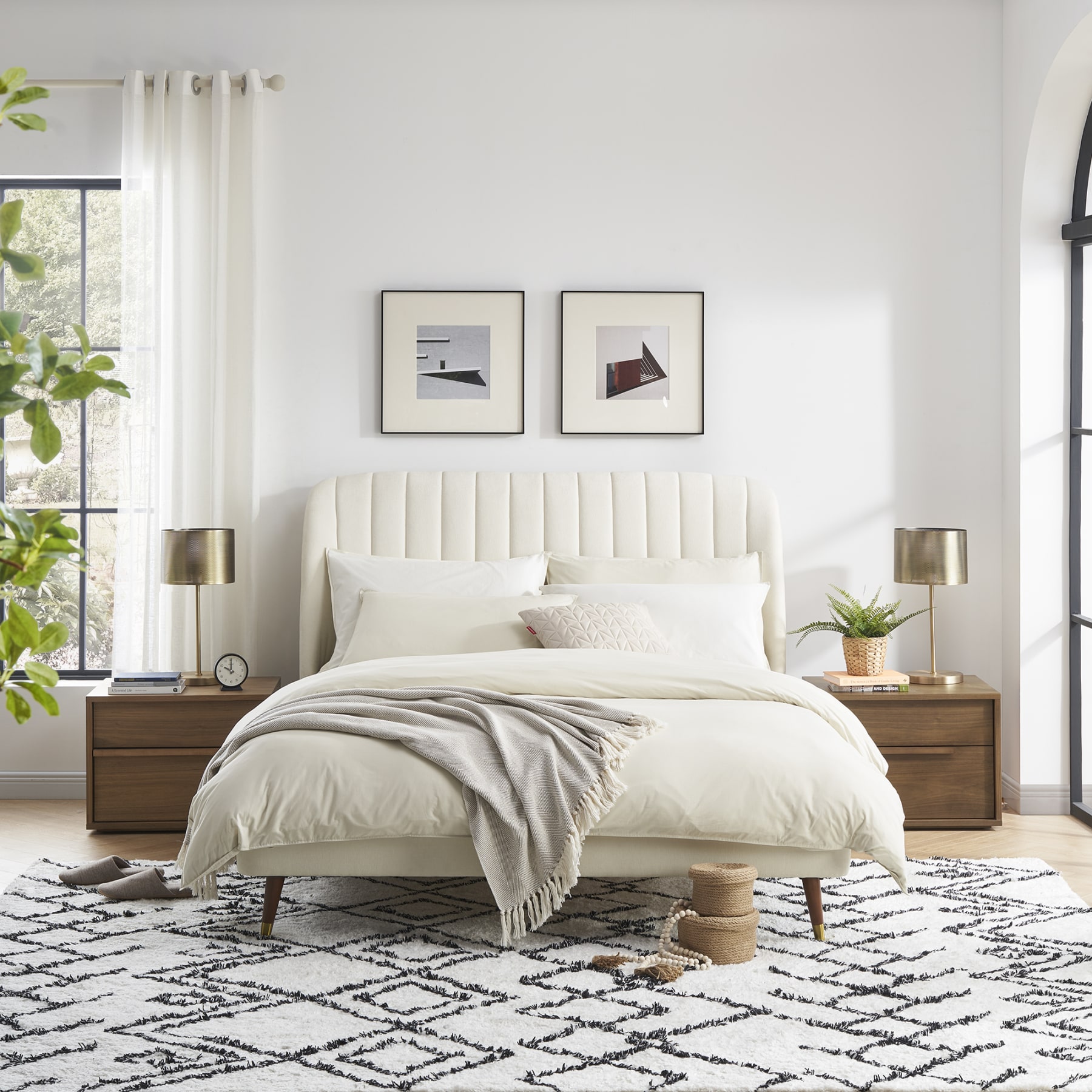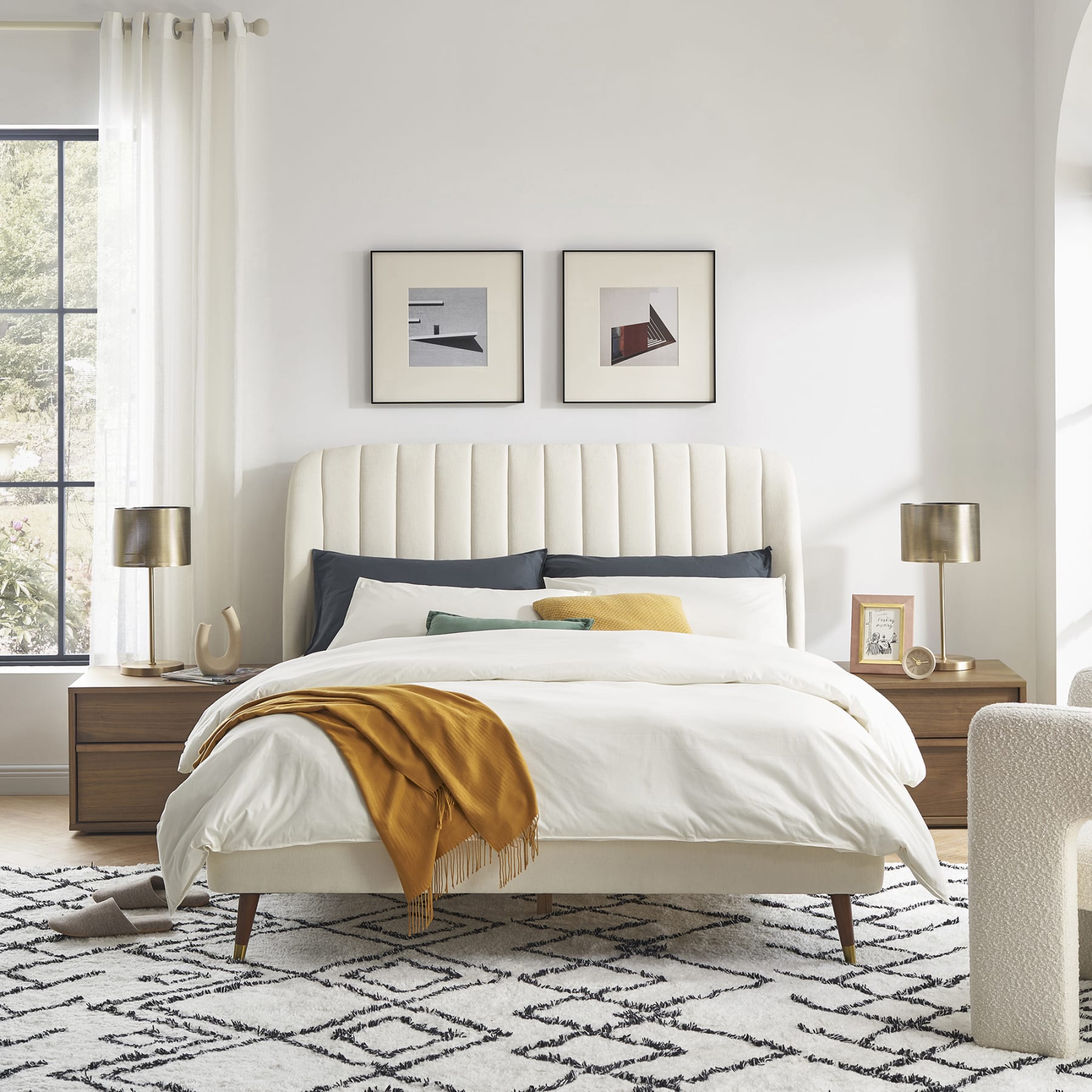
What is the Best Thread Count for Sheets?
There are few things better than climbing into a bed that’s been freshly made up with soft, cozy sheets. Comfortable, relaxing, and wonderfully indulgent, quality bedding can ensure a good night’s sleep while adding visual appeal to your bedroom.
One of the most important things to consider when buying new sheets is the thread count. In general, sheets with a higher thread count are softer, smoother, and more durable compared to those with a lower thread count. However, while thread count can be an indicator of quality, this isn’t always the case.
So, to help you find the sheets that are perfect for your bed, we’re taking a closer look at thread count and what this really means.
What is a thread count?
Thread count refers to the number of threads woven into one square inch of fabric. It’s measured by counting the number of vertical warp threads and horizontal weft threads contained in the material. The thread count of a sheet tells you the number of yarn threads in a square inch of fabric.

No sweat – For those who tend to sleep warm, the Percale Duvet & Sheet Set is cool to the touch, keeping you comfy throughout the night.
Generally, bedsheets with a higher thread count are made with finer yarns, resulting in a smoother, denser, and more durable fabric. The sheets may also feel heavy, something that can make bedding feel even more luxurious and indulgent.
These fabrics cost more to make and are usually more expensive than other bedsheets. Some bed sheets that typically have a higher-than-usual thread count include Egyptian and Supima cotton sheets.
What affects the thread count?
Weave
The type of weave can affect the thread count of the bed sheet. There are two standard weaving methods used: sateen and percale. Sheets made with a sateen weave are thicker and more tightly woven compared to those made using percale.
When a sateen weave is used, there are fewer intersections between vertical and horizontal threads compared to a percale weave. This means that more threads can be packed into the same area, resulting in a heavier fabric and a higher thread count.
Sateen fabric often has a luminous finish while percale sheets typically have a matte appearance. If you have lighting on your nightstands, you may notice that your sateen sheets glimmer in the evenings when the sun goes down.

Lightweight yet extremely durable, the Percale Duvet & Sheet Set gets softer with every wash.
Material
The material of the bed sheet can affect the thread count, as different types of materials have different characteristics and textures that can impact how tightly the threads can be woven together.
For example, cotton fibers can be spun into fine, strong yarns that can be tightly woven together to create a high thread count. On the other hand, materials like linen have shorter and thicker fibers, which can make it difficult to achieve a high thread count. But, this doesn’t mean that linen sheets are of lower quality - they simply have other qualities like being more breathable and cool to the touch.
So, check the materials that are used in your bed sheets to determine what the thread count range should be.
Multiple threads
If sheets have a very high thread count, it could indicate multiple strands are being twisted together to create a single yarn. When this happens, the threads being used can be very thin. As a result, the fabric is likely to be weak and of low quality even though it has a very high thread count.
Sheets made with multiple threads can also feel denser and less breathable than fabric made using a standard weave.

Sleep easy knowing that our beddings are OEKO-TEX certified and free of harmful substances.
After all, remember that while good-quality sheets can feel like magic, they can’t defy the laws of science. Up to a certain point, it’s just not physically possible to weave single-ply threads so tightly.
Metric vs Imperial
Another thing that can have a big impact on the thread count is the measuring system that’s used. Most manufacturers use inches when discussing thread count. If centimeters are used instead, the thread count will be artificially inflated, without any corresponding improvement to the quality of the fabric.
To give you an example of just how big the difference is, a sheet with a 240 thread count in one square inch would be 300 thread count in one square centimeter. So, when choosing new sheets, make sure you check the small print to see exactly what you’re buying.

Subtly textured for a cozy, lived-in atmosphere, the Waffle Set features soft percale on the reverse.
What is the best thread count for sheets?
While many people believe that the highest thread count is always the best choice, this isn't necessarily true. In fact, a thread count that's too high can actually make sheets feel heavy and stifling. On the other hand, sheets with a thread count that's too low may feel rough and scratchy.
So if both a high and low thread count can mean the sheets are poor quality, what is the best sheet thread count for bedding?
For most people, the perfect thread count will be somewhere around 300 to 500. This range provides a balance between softness and durability and is suitable for most people. If you're looking for something more luxurious, you can opt for sheets with a higher thread count. Sheets with a thread count of 600 or more will feel incredibly soft and silky, but keep in mind that they may also be more expensive and require extra care.
Here’s a general range of good thread counts for some common bed sheet materials:
Cotton: 300 to 500
Egyptian cotton: 400 to 800
Supima cotton: 300 to 600
Linen: 80 to 150
Silk: 400 to 600
It's worth noting that these are general ranges and thread count can vary depending on the manufacturer and specific product.
Recommended read: 13 Types of Bed Sheets and Which Material is the Best
How to choose the right thread count?
When choosing the right thread count for your needs, it will depend on a variety of factors such as your budget, personal preferences, and sleeping habits.
If you tend to sleep hot, for example, you may want to choose sheets with a lower thread count, as they will be more breathable and cooler. Similarly, if you have sensitive skin or allergies, you may want to opt for sheets with a lower thread count, as they are less likely to cause irritation.
We hope that this article has given you a better understanding of what a thread count is. Remember that thread count shouldn’t be the sole indicator in your decision-making - other factors like the material, weave type, and ply should all be taken into consideration too.
Ultimately, the best bed sheets for you will depend on your personal preferences and needs, such as the level of softness, breathability, and durability. By taking a holistic approach to selecting bed sheets, you can find comfortable and high-quality bedding that will provide you with a restful night's sleep.
































